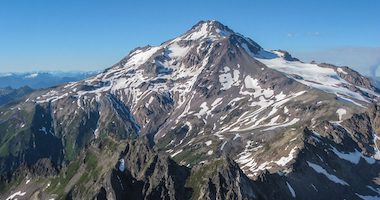Carstensz Pyramid: Creating the Sugapa Route Visitor Protocols
Posted by: Alex Van Steen
Categories: Guide News Carstensz Pyramid Responsible Climbing


In February 2013, I spent several weeks in West Papua with the express intention of connecting with villagers who live along the trek followed by our Carstensz Pyramid climbing programs. I traveled with two translators - one a long-time friend who grew up in West Papua and the other a member of the Moni tribe, a man who truly has a good heart for his people.
I visited about ten villages and had numerous trailside chats. I spent many hours chatting (as well as eating, and playing soccer & table tennis!) and had opportunities to share our vision with various folks: government officials, village elders, tribal chiefs, pastors and school teachers.
The constant thread throughout the conversations involved villagers expressing frustration with tourists who came to “take photographs” and “take summits” but who did not (as it was described to me) “give relationship.” It is understandable that folks were upset when they weren’t paid as promised by unscrupulous outfitters or when they felt unsafe being asked to porter into the high country (the tribal peoples have not traditionally traveled above the jungles, see story below), but it truly resonated with me that when they felt most disrespected was when they were treated as if they were nothing more than pack animals. Quite frankly, they explained, why should they leave their tribal community and upset their daily lives only to be mistreated or underpaid?
I knew that in order to eat this elephant, I would need to take it one bite at a time, so I started with small bites of “giving relationship.” I found that when I played soccer (which I am convinced is the lingua franca of relationship) with the local men and boys on village airstrips, that we had laughs to share (mostly at me tripping on the uneven surface!); when I offered to show folks photos of my family, they showed me their village (!); and for all my “otherness” (some folks, I was told, had never seen white-skinned people), I was never denied the hospitality of a meal or a hut as respite from the rain.
Another small bite was the creation of the protocols (below) to be posted in a church along our route. The pastor in this village of twenty people, a good man named Atan, had initially wanted to run me off. I agreed to keep walking, but in deepening the conversation as to why, I learned that an earlier group of tourists had – in his word – “desecrated” the church by leaving garbage there. I whole-heartedly agreed that such practices were unacceptable, and offered to create protocols to instruct tourists how to behave. Through my translators I was able to build a simple list of what it would take for his village to feel respected. They fully wanted tourists to stop for the night but they also needed tourists to respect that privilege.
As I look forward to my next trip, I hope to take a few more bites of the elephant!
THE SUGAPA ROUTE VISITOR PROTOCOLS
This church serves an important role in the community. Guests are welcomed to find refuge here and are asked respect the following requests. This will help ensure use of the building for future travelers.
• Please stay off of the raised area which surrounds the altar. This area is for local religious personnel only and it is considered offensive if others trespass there.
• Please keep hot water, stoves & cookware out of the building. This helps keep the area clean.
• Please hang a trash bag just outside the building to collect your garbage. Villagers will burn your trash for you.
• Because of the importance of Sunday worship, travelers should not expect access to the building on Saturday evenings or Sundays.
• Please do not use the church grounds or property for toilet needs. Ask the Pastor of the church where it is appropriate to wash and use the bathroom.
• Please offer a donation for your use of the church. This is an appropriate and considerate way of expressing thanks.
Download a multi-lingual copy of the Sugapa Route Visitor Protocols here.
| The Moni name for Carstensz is Mbai Ngela. It means "Forbidden Egg." The story is that in years gone by when the mountain was snow covered, it resembled an egg, and the fore-fathers forbade their people from going there because it was the hunting grounds of evil spirits and those spirits always killed those who ventured there. Even today, villagers have a very difficult time understanding the science of hypothermia and often will point to and tell of places along the way where the spirits have killed a poor wayfarer! |












Comments (1)
Hi Alex, Glad to see you are still at it and your spine is still in good enough
shape to climb the big ones! Not sure if you remember me, but I was your
chiropractor in Federal Way, and we ran into each other on Rainier in ‘95.
Hope all is well with you and yours. Drop me an e-mail if you have a chance.
Chris
P.S. gourds on the unit are the custom in Papau!
Posted by: Chris Mallory on